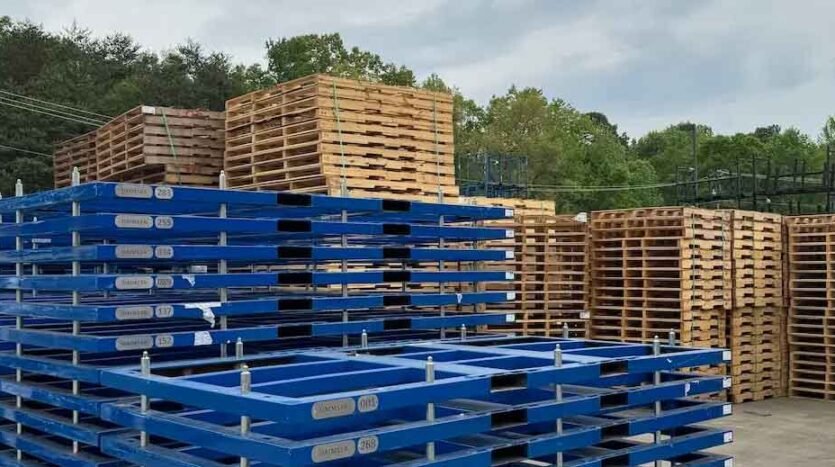The Importance of a Dunnage Rack in Storage Solutions
Dunnage racks are a staple in today’s storage systems, offering an easy way to keep products out of the floor. The simple, yet efficient, design offers cleanliness, better airflow, and easier access to storage. In warehousing, manufacturing, and food service, steel racks offer enhanced organization and health regulation. Versatile and long-lasting, they’re part of many industries that desire to maximize storage and streamline operations. Quality dunnage rack investment can improve operational efficiency and regulatory compliance. In this article, we’ll discover the best materials and applications of steel racks.
Material Options for Dunnage Racks
Choosing the right dunnage rack materials is important to give it longevity, performance, and cost-effectiveness. Consider these variants:
- Aluminum Dunnage Rack– Aluminum racks are light but strong, corrosion and rust-resistant, and thus ideal for food storage and usage in wet environments.
- Stainless Steel Dunnage Rack– Highly resistant and impervious to moisture and chemicals, steel racks are commonly used in hospital settings and restaurant kitchens.
- Heavy-Duty Dunnage Rack – Apart from material, load capacity is also important. Designed for intense use, these racks are strong enough to withstand harsh conditions while able to withstand great weights.
In selecting a dunnage rack, you should also consider exposure to moisture, anticipated weight capacity, and budget. Sanitation conditions can be catered to by utilizing high-grade stainless steel, while aluminum is an affordable yet strong choice. Heavy-duty types offer ruggedness for demanding applications, so they become a long-term investment for various industries.
Heavy-Duty Dunnage Racks: For Industrial and Commercial Use
For businesses requiring heavy-duty storage equipment, load-capacity racks offer the most stable and strongest solution. If you are interested in how to use a dunnage rack, here are the most common applications:
- Commercial Kitchens – Preventing foodstuffs from being on the floor to satisfy health codes and prevent contamination.
- Warehouses – Holding heavy inventory loads with steady support and maximizing space utilization.
- Industrial Environments – Holding bulky machinery and supplies in factories and manufacturing plants.
A heavy-duty dunnage rack is characterized by a reinforced building, heavy weight-bearing capacity, and durable materials like stainless steel or aluminum. Businesses involved in large-scale operations benefit from the investment in these racks since they provide reliability and structural integrity.
Benefits of Using Dunnage Racks in Food and Warehouse Storage
Food storage and warehousing food service solutions must be extremely sanitary and organized. Dunnage racks for commercial use help businesses achieve these requirements in a way that maximizes efficiency:
- Staying Clean – Elevating products from the floor, the racks reduce the accumulation of dust and lower contact with pests.
- Keeping Out Contamination – Due to health regulation requirements, food storage racks keep perishable goods away from moisture and bacterial contamination.
- Maximizing Storage Space – They enable more effective utilization of vertical storage, reducing clutter and improving workflow.
In a restaurant, grocery store, or logistics center, the aluminum dunnage rack improves product durability, organization, and overall workplace safety. Their ability to maximize storage space while safeguarding items from damage makes them a must-have for companies seeking to streamline operations and meet industry regulations.
Choosing the Right Dunnage Rack: Size, Weight Capacity, and Function
A comprehensive analysis of your storage needs will allow you to invest in a sound and valuable solution. Selecting the ideal warehouse storage racks is dependent on several factors, including:
- Size Factors – Measure available storage space and choose a rack that will fit exactly without hindering anything.
- Weight Capacity – Ensure the rack is capable of carrying the required load, be it bulk ingredients in a kitchen or heavy stock in a warehouse.
- Application-Specific Features – Restaurants would require easy-clean stainless steel racks, while warehouses would need high-capacity aluminum racks.
Finally, choosing the right stainless steel dunnage rack ensures better organization, durability, and compliance with industry standards. Companies should also consider ease of maintenance, mobility options, and integration with existing storage facilities to get the most out of their investment. No doubt, the dunnage rack remains a vital element in storage management, offering strength, cleanliness, and space efficiency. The inclusion of these racks in a storage system helps to boost workflow, reduce risks, and maximize overall productivity.


